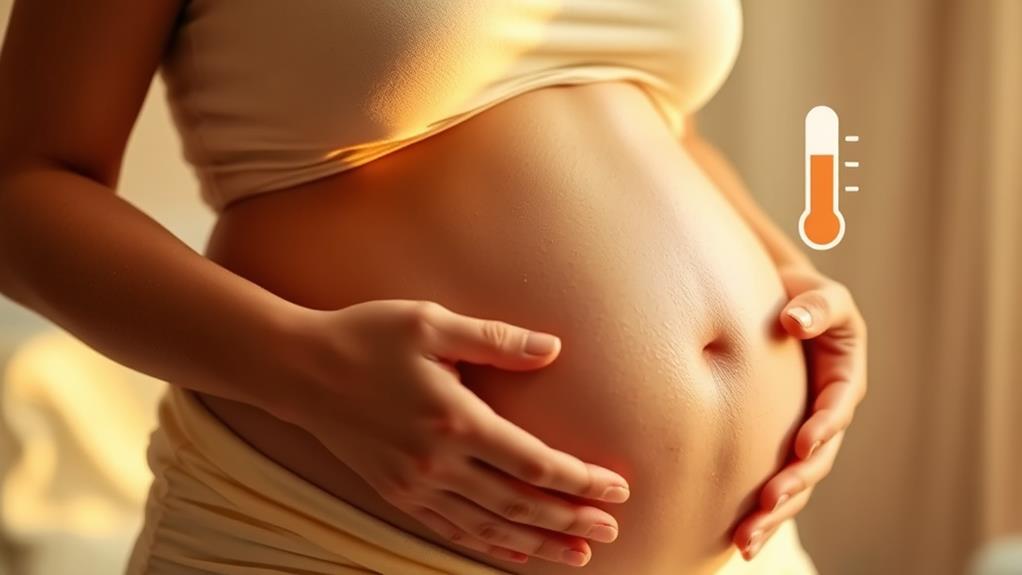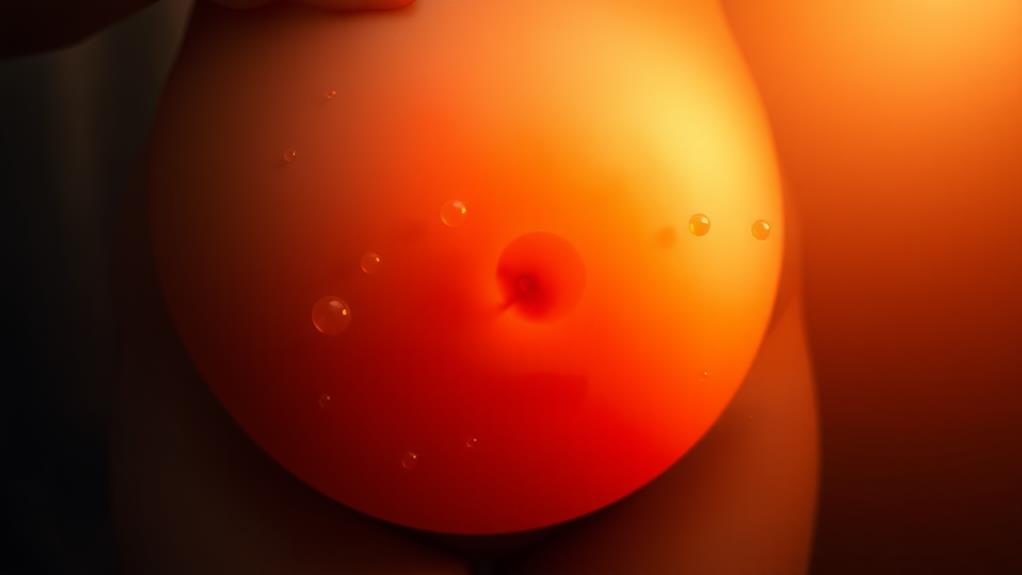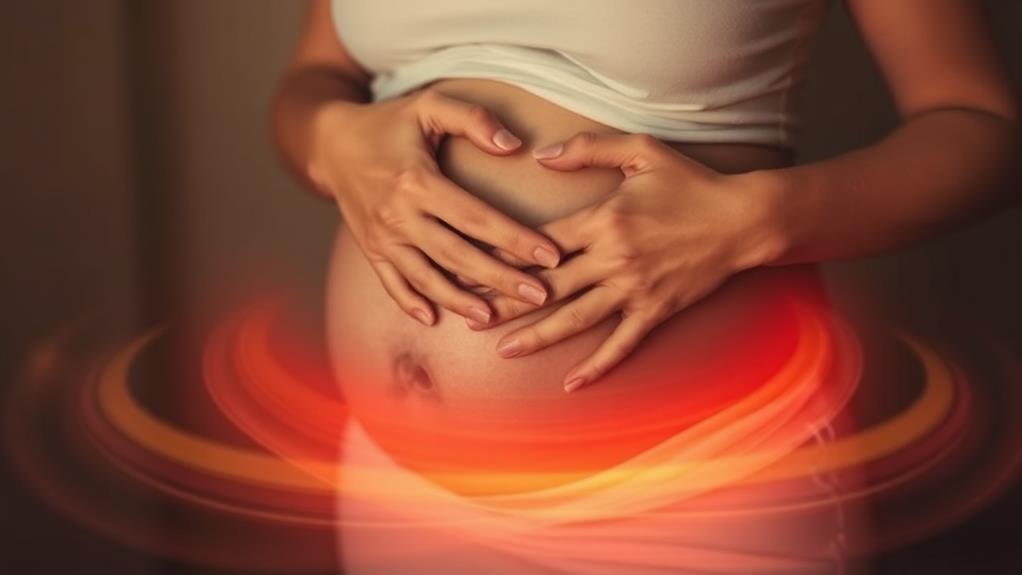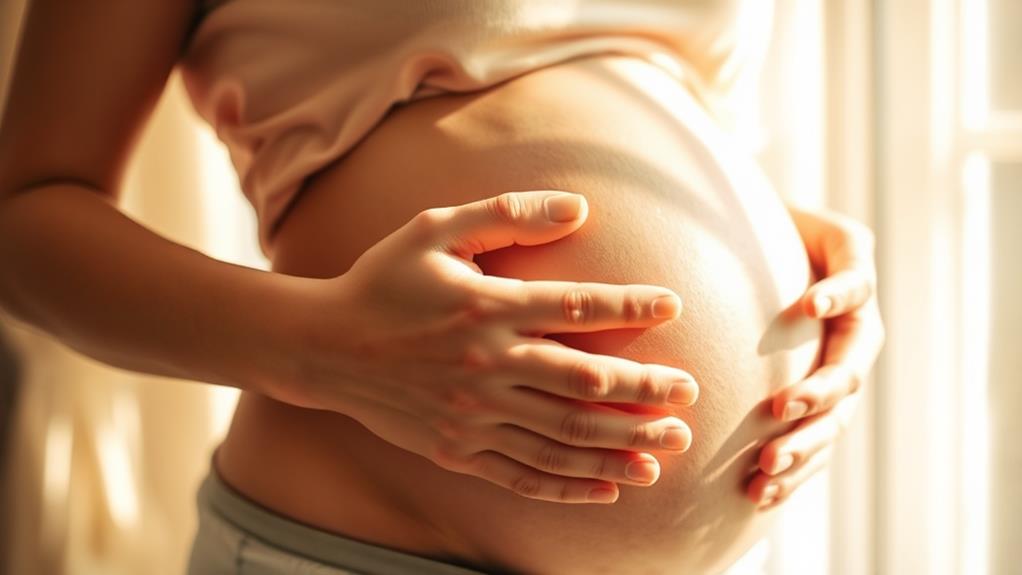13 Warning Signs That Your Baby May Be Overheating in the Womb
When you're pregnant, it's vital to remain vigilant about your health and your baby's well-being. Overheating in the womb can lead to serious complications, and recognizing the warning signs is important. You might notice symptoms like increased body temperature or unusual fetal movements that could indicate trouble. Understanding these indicators can help you take timely action. But what specific signs should you be on the lookout for, and how can you differentiate between normal discomfort and alarming symptoms? Let's explore this topic further to guarantee both you and your baby stay safe.
Increased Maternal Body Temperature

When you notice an increased maternal body temperature, it's crucial to pay attention, as this can be a significant warning sign of potential overheating in your baby.
Your body works hard during pregnancy, but a rise in temperature could mean your little one is feeling a bit too warm. This can happen if you're out in the sun for too long or if you're bundled up in heavy clothes.
Keep an eye on your temperature, especially during hot weather or after exercise. If you feel warmer than usual, try to cool down.
Drink plenty of water, find some shade, or take a cool shower. It's like giving your body a rejuvenating treat!
Excessive Fetal Movement
Increased maternal body temperature can be a sign that your baby is feeling overheated, and this might manifest as excessive fetal movement. You might notice your little one kicking and squirming more than usual.
While some movement is perfectly normal, if it feels like your baby's hosting a dance party in there, it could be a red flag. Babies typically have periods of rest and activity, but when they're too warm, they might get a little too energetic!
Keep an eye on how often and how vigorously your baby moves. If it feels like they're practicing for the Olympics, it's worth paying attention to. A change in your baby's movement patterns can signal discomfort. Think of it as their way of saying, "Hey, it's a bit too toasty in here!"
If you're feeling extra warm or sweaty, try cooling down with a fan or a cool drink. Staying hydrated is super important, too!
Unusual Fetal Heart Rate

Sometimes, a baby's heart rate can signal overheating or distress. If you notice your baby's heart beating faster than usual—over 160 beats per minute—it might be time to pay attention. Just like you get a little hot under the collar when you run around, your baby can feel the heat too!
A rapid heart rate isn't always a cause for alarm, but it can indicate that something's not quite right. Maybe your little one is just excited, or perhaps they're feeling the effects of being too warm in there. If you're feeling extra warm, it's worth keeping an eye on their heart rate.
Listening for that little thump-thump can be comforting. If you have a home Doppler or if your doctor checks it, notice if it seems off. If you're ever in doubt, don't hesitate to reach out to your healthcare provider. They're like your baby's emergency hotline!
Keeping tabs on your baby's heart rate can help you spot potential overheating. After all, you want your little one to be cool as a cucumber, even in the cozy confines of your belly!
Dehydration Symptoms in Mother
A rapid heart rate in your baby can often be linked to conditions affecting you as well, including dehydration. When you're not drinking enough water, your body can start to feel a bit wonky. You might notice some signs that your body is sending out a distress signal.
First, pay attention to your thirst. If you're feeling parched, it's a good sign you need to hydrate.
Next, check for dry mouth or chapped lips. These little indicators can mean your body's running low on fluids.
Also, if you're feeling unusually tired or dizzy, that's another cue. Your body's working hard to keep everything balanced, and dehydration can throw it off.
Don't forget about your urine! If it's dark yellow or you're not going as often, that's a clue you need to drink up.
Remember, staying hydrated is super important, not just for you, but for your little one too. So, grab that water bottle and sip away!
After all, nobody wants to be a human raisin, right? Keep those fluids flowing, and you'll both feel much better!
Changes in Amniotic Fluid

Changes in amniotic fluid can signal important developments in your pregnancy. You might notice that the amount or color of this fluid changes, and that can be a clue about your baby's well-being.
If the fluid seems to get less, it could mean your baby is a bit too hot in there. On the flip side, too much fluid might mean your little one is struggling to cool off, kind of like a water balloon on a summer day!
Pay attention to the color, too. If it's cloudy or has a strange tint, that might suggest an issue that needs to be checked out.
It's like your body's way of sending you a little alert: "Hey, something's up!"
Skin Rashes or Irritation
Skin rashes or irritation can be a telltale sign that your baby is overheating. You might notice red patches or tiny bumps on your belly, which could be your little one's way of saying it's getting too warm in there. Just like how you feel uncomfortable in hot weather, your baby can feel the heat too.
If you see these rashes, don't ignore them! They might appear in areas where your skin rubs against clothing or where there's extra moisture. Think of it as your body's way of sounding an alarm. You want to guarantee both you and your baby stay cool and comfy, so it's a good idea to check your environment.
Keep the room temperature pleasant, and wear light, breathable clothing. After all, nobody likes feeling sticky and itchy!
Staying hydrated is also essential, as it helps regulate body temperature. If the rashes persist or you're worried, don't hesitate to reach out to your healthcare provider. They're there to help keep you and your baby safe, happy, and rash-free!
Frequent Nausea or Vomiting

Sometimes, frequent nausea or vomiting can indicate that your baby is overheating. You might think it's just a case of morning sickness, but if it happens often and doesn't seem to let up, it could be a sign to pay attention. Your body's trying to tell you something, and it's important to listen!
When your baby gets too hot, it can cause your body to react in strange ways, including feeling nauseous or even throwing up. If you notice this happening a lot, it's worth checking in with your doctor. They can help figure out if your baby's heat levels are getting a bit too toasty.
Staying hydrated is essential, too! Drinking water can help keep both you and your baby cool.
Plus, nibbling on some light snacks might help settle your stomach. Think crackers or toast—nothing too heavy!
Swelling of Hands and Feet
Swelling of your baby's hands and feet can be a noticeable sign that they're overheating. When the temperature inside your belly rises, fluid can build up in those tiny extremities, making them look puffy. It's kind of like when you eat too much salty food and your fingers feel like sausages!
If you notice your baby's hands or feet feeling unusually swollen, it's worth paying attention to. This can happen if you've been feeling too hot, or if you've been out in the sun for too long. Remember, babies are sensitive little beings, and they don't have the same ability to cool themselves down as we do.
If you find that your baby seems to be swelling, try cooling off. You can drink some cool water, find a shady spot, or even put a cool cloth on your forehead. This helps you and your baby feel more comfortable.
Keep an eye on those little hands and feet, and don't hesitate to call your doctor if you're worried. It's always better to be safe than sorry when it comes to your baby's health!
Unexplained Fatigue

Unexplained fatigue in your baby can be a concerning indicator of overheating. If your little one seems unusually tired or lethargic, it might be worth paying attention. Babies are usually full of energy, doing little kicks and flips as they grow. So, if your baby suddenly seems less active, it can raise a red flag.
You might notice this fatigue during your routine check-ups or when you're relaxing at home. If you find your baby isn't responding to your gentle pokes or those classic belly rubs, it could be a sign they're feeling too warm. Just like you'd feel sleepy on a hot day, your baby can feel the same way inside your womb.
Keep an eye on their activity levels. If they're not moving around as much, try changing your position or going for a walk. Sometimes, a little shift can help cool things down.
Shortness of Breath
If your baby is showing signs of fatigue, it's important to monitor their breathing as well. Shortness of breath can be a warning sign that something isn't quite right.
You might notice your little one's movements becoming sluggish or irregular. It's like they're trying to swim but can't quite find their rhythm.
When you feel those little kicks, pay attention. If the kicks are faint or stop altogether, it could mean your baby is struggling a bit. You know your body best, so trust your instincts.
If you feel concerned, don't hesitate to reach out to your healthcare provider. They can help assess the situation and guarantee everything is okay.
Remember, staying hydrated and keeping cool can help prevent overheating. It's like making sure your baby has a comfy blanket, just without the heat!
If you notice any changes in your baby's breathing or overall movement, it's always better to be safe than sorry. Your little one relies on you to keep them safe and sound.
Stay alert and monitor those signs; you're doing great!
Headaches or Dizziness

Sometimes, headaches or dizziness can signal that your baby is overheating. If you're feeling a little wobbly or your head's pounding, it's time to pay attention. Your body's response to heat can affect your little one, too. When your temperature rises, your baby might be feeling the heat as well, and that's not great news.
You might wonder why this happens. Well, when you're hot, your blood flow changes, and that can lead to those pesky headaches. Plus, dizziness can make you feel as if you're on a merry-go-round that just won't stop!
If you find yourself in this situation, take a moment to cool down. Drink some water, find a shady spot, or even kick your feet up for a bit.
Listening to your body is super important. If headaches or dizziness persist, it's best to reach out to your healthcare provider. They can help you figure out what's going on and make sure your baby stays safe and cozy.
Decreased Appetite
A sudden decrease in your baby's appetite can be a telling sign of overheating. If you notice that your little one isn't as hungry as usual, it might be time to pay attention. Babies in the womb get their nutrients from you, so any sudden shifts in their eating habits can be a red flag.
Overheating can make your baby feel uncomfortable, and just like us, a hot baby mightn't feel like eating. You might find that they're less active too, which can contribute to that dip in appetite. It's like when you're too hot at the beach and all you want is a cool drink instead of a big meal!
If your baby's appetite drops considerably, it's wise to monitor other signs of overheating, like your own body temperature.
Staying hydrated is key, not just for you but for your baby too. So, drink plenty of water!
Altered Sleep Patterns

When your baby starts experiencing altered sleep patterns, it can signal overheating. You might notice your little one is more restless than usual or seems to be waking up frequently. Babies usually have a routine, so sudden changes can be a clue that something's not quite right.
If your baby's sleeping more during the day and less at night, or if they seem fussy and unable to settle down, it's important to pay attention. Just like you, babies don't sleep well when they're too hot. They might wiggle, kick, or even cry, trying to get comfy.
You know how annoying it's when you can't find that perfect sleeping position? Well, your baby's feeling that too! It's crucial to create a cool, calm space for them. Keep the room at a comfortable temperature, and dress them in light, breathable fabrics.
If you're worried about these altered sleep patterns, don't hesitate to reach out to your doctor. It's always better to be safe than sorry! After all, you want your baby to sleep soundly, just like you do—minus the midnight snack runs!












Post Comment